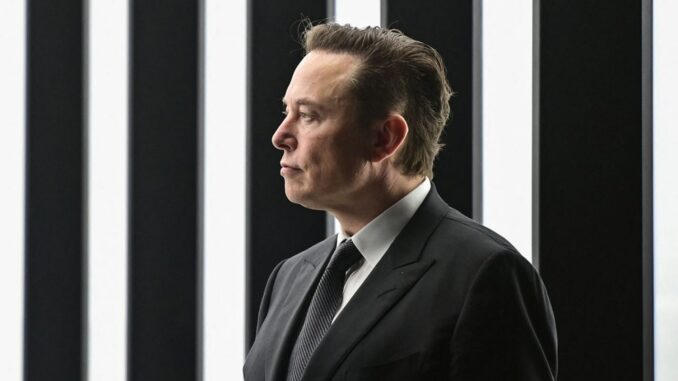
For the record:
4:35 p.m. Oct. 28, 2022: An earlier version of this piece said Twitter sold for $44 million. It sold for $44 billion.
My plan was to dither. I find that if I plan to dither, the chances are high I’ll follow through.
This week, while the World’s Richest Man, Elon Musk, now Twitter’s owner and overlord, was lying in wait to seize the company, the question before a noisy swath of the platform’s 400 million users had become: Should I stay or should I go?
That’s where the dithering came in. I couldn’t decide, so I decided to not decide.
Musk had dithered too. Like a klutzy pickup artist, he courted Twitter and then snubbed it and then proposed marriage, all while proclaiming his contempt for all it stands for.
When he finally did close the deal for $44 billion Thursday, he instantly fired several key executives and acted like Twitter was his destiny. But for months there was no telling if he’d really close.
There’s still no telling if he’ll stick with it, if it will hold his scattered attention.
Will he actually follow through on his reckless fantasies of firing up to 75% of the staff, dropping content moderation, opening up the platform to election and COVID and Holocaust deniers, and reinstating Donald Trump, who was banned from Twitter on Jan. 6, 2021, for inciting violence?
What a short, strange trip it’s been. Just five months ago, on April 5, a securities filing revealed that Musk had become Twitter’s largest shareholder. That very day, Twitter’s then-Chief Executive, Parag Agrawal, asked Musk to join the board.
“He would bring great value,” Agrawal tweeted, decorously. One week later, Musk declined. “I believe this is for the best,” Agrawal tweeted, decorously. (Self-appointed Twitter CEO Musk fired former CEO Agrawal Thursday.)
A few days after Musk bowed out of board participation, in a bid that looked hostile, he offered to buy the company at $54.20 per share. Twitter accepted.
Then Musk slowed his roll. He told Twitter the platform was filled with spam; Agrawal rebutted the charge, decorously. Musk shot back: Poop emoji. Cool.
In July, Twitter sued Musk and Musk sued Twitter. In September, the Twitter board approved the $44-billion deal. If the company dropped its lawsuit, Musk said, he’d be back with his checkbook. On Wednesday, he christened himself Chief Twit, and on Thursday the deal was done.
Even as I have weighed the pros and cons of my own Twitter participation, I figure the key is scanning the horizon for a vibe switch.
If the right-wing bellowers fill the Twitter halls with hyena laughter, if the door is opened to 4chan-caliber filth, if black mold chokes the place, it’s hard to imagine staying around.
Musk tweeted “the bird is freed” on Thursday to celebrate his purchase — or perhaps to cover his buyer’s remorse. I had already downloaded my tweet history, packed my go-bag. Later in the day, I wasn’t the only tweeter wondering: What next?
Some are proposing a return to nature. (As if!) Others suggest Instagram. Neither, I have to admit, is suited to my Twitter purpose, which has been — sentimentally enough — to learn. I’m with the Yale historian Joanne Freeman who tweeted Thursday: “I would be sad not to have this venue for discussing history and politics!”
Another proposal: Tribel, a Twitter semi-dupe that styles itself as a haven for progressives. I signed on, only to discover that Tribel is a project of Occupy Democrats, a partisan propaganda outfit. There were loony lefty folktales about Fox folding and John Fetterman winning the Pennsylvania Senate race by a million.
Shameless disinformation is repellent, even from one’s own side. I quit Tribel — or, as I now call it, Blue Newsmax — five minutes after I started.
Planetary is another service mentioned. It’s promising. It boasts decentralized servers, but it is very, very new and thus very, very buggy.
For now, a lot of people appear to be heading for the Twitter exits even without a solid alternative. And even before Musk took over.
This week, Reuters acquired an internal research document from Twitter called “Where Did the Tweeters Go?” which revealed that, since the start of the pandemic, power users, who generate half of global revenue and 90% of all tweets, have been in “absolute decline.”
Big accounts — @justinbieber, @ladygaga — now post infrequently and in a pro forma style. And tweets that push cryptocurrency and porn are the platform’s fastest-growing topics among heavy users on English-language Twitter.
This redlight-district Garbage-Pail-Kids stuff repels advertisers. And the second Musk took the reins, racist trolls cheered, blasting feeds with the N-word and antisemitic hate. “Elon now controls Twitter,” one said, “Unleash the racial slurs.”
Anecdotally, follower counts are falling; I know mine are. But boycotts in the digital age are generally busts. Idle threats to delete Uber or Facebook en masse have not amounted to much, so some imperious Twitter quitters (“this is a cesspool, a hellhole!”) are being charged with crying wolf.
Many journalists, writers, professors and performers have resolved to stay on, but just to tweet out their news and work. A jokey movement is also afoot to “Tumblrize” Twitter — overrun it with smut and desert it, as users did to Tumblr after Yahoo acquired it in 2013,
I issued a Twitter poll last week. When Musk arrives, I asked, will you (a) leave (b) stay (c) dither (d) fake leave? With some 450 replies, “leave” came in second and “dither” came in first.
It’s the only way. Until the vibe shift is clear, I’m giving in to my Clash-like confusion: If I go there will be trouble. And if I stay it will be double.
Virginia Heffernan is a columnist for Wired magazine and the author of “Magic and Loss: The Internet as Art.” @page88
This story originally appeared in Los Angeles Times.
END

Be the first to comment